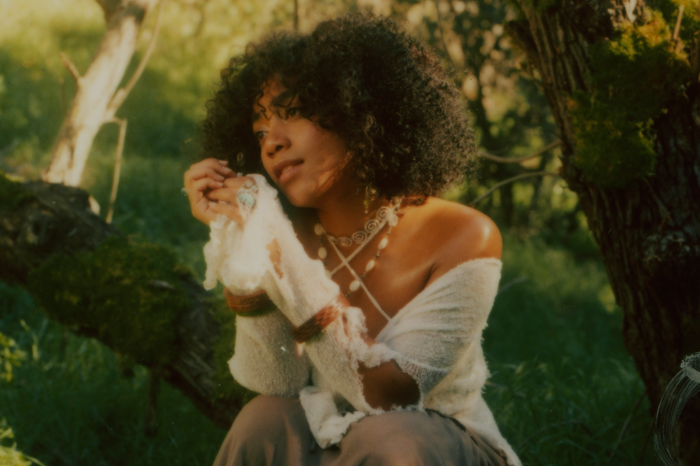
Sixty affirmations can pour out of UMI in a single sitting. The 24-year-old L.A.-based singer has been immersed in the world of wellness since the end of high school, when she began using grounding practices like meditation to combat anxiety. By March 2020, she started sending digital affirmations to her fans (“The more I listen to my spirit, the more my spirit speaks to me 🕊,” she wrote earlier this week), curating a daily schedule based on when she thinks they needed to hear them most. But sometimes, she has one that can’t wait. “I’ll deadass text people at 2 a.m.,” she confesses. “Everyone’s asleep. But I’m like, they’re my friends!”
UMI grew up making songs in the “majestic, Narnia-like forest” of her hometown, Seattle. Today, her work — which she pairs with guided breathwork and sound baths during live shows — is marked by lush beats, intimate vocals, and lyrical references to nature. “I feel like my music feels so calming because I’m really tuning into: What does nature feel like? And how can I turn that into a song?” she says. “It gives you the same feeling as a walk in the park.” That approach has attracted a global fan base that includes V from BTS, whom UMI collaborated with on “Wherever u r” in December. The song has dominated global iTunes charts, introducing UMI to a new crop of listeners just in time for her four-song EP Talking to the Wind, her first independent release since leaving RCA’s Keep Cool Records. It is also her seventh project in seven years, a pace UMI plans to maintain for the foreseeable future. “I know when I’m meant to be making music and it’s time,” she says. “I feel it in my bones, and so I’m just excited to let it out.”
V has praised your music multiple times, and you’ve described nervously throwing your phone after DM-ing him to say thanks and bring up the idea of doing a song together. As a BTS fan since high school, how did you get comfortable enough to work with him?
If I share my music, I’m already sharing the most vulnerable parts of me. We started off knowing and admiring each other’s music, so we got to know each other’s hearts in a way. When we started talking, I was like, wait, whoa, you’d be my friend. Like, if we both lived in L.A. and bumped into each other, I’d be like, Yo, what’s up? and we would hang out. We have very complementary energy.
What parts of the collaborative process surprised you?
How detail oriented he was. I like my first take the best, usually. It was cool to work with somebody who was like, Oh, the first time I did it was a practice and now I’m going to perfect it and I’m going to refine it again. He really cares about everything he shares.
The song’s message of sending love to someone you’re physically separated from applies to V’s military enlistment, but your initial inspiration was your grandmother in Japan. Has she heard it yet?
Yeah! She loved it from the beginning. But my grandma … she understands what I do, but she doesn’t fully get the extent of it. So she was like, Wow, so great! Don’t forget to keep practicing your voice lessons. Very Japanese of her.
How would you describe your relationship with the BTS ARMY? They definitely know how to organize around a release.
When there were incorrect lyrics on streaming services or it wasn’t up at the same time on Amazon India or something, everyone was giving me so much feedback. And like you said, they’re so organized. I was blown away and heavily inspired, because it opened my perspective. I think in America, it seems like in order for a song to really blow up, it takes luck and it takes an algorithm. After getting to know ARMY, I was like, oh, it just takes community. It takes mobilizing and organizing. So I’m like, whoa, this is the future. This is how I want to do all my releases. It takes the power out of the corporations and puts it back in the fans.
And I feel like I’m, like, besties with the ARMY now. I mean, we be talking on Twitter every day. They send me edits and tips and gratitude; they tell me when there’s something I need to reword … I’ve just learned a lot from them, and I really love everyone.
“Wherever u r” hit No. 1 on iTunes in more than 100 countries and debuted at the top of the “Billboard” R&B Digital Songs Sales chart. Has its success added any pressure for your future solo releases?
Initially, if I think about it, my ego will come up and get scared, like, will it happen again? But these days, I’m feeling excited for and confident about the future. It was my belief in myself and the hard work and commitment I’ve been putting in for years that snowballed into what’s happening. So if that can happen, what else can happen? Also, I very much believe everything’s gonna happen exactly how it’s supposed to happen. I can’t stop it and I can’t force it, either. So I’m just trying to remain open to whatever the future has to bring, knowing that the possibilities are limitless.
Are there any K-pop idols besides V you keep in touch with or want to collaborate with? Sana, Kim Lip, Choerry, and members of P1Harmony came to your show in Korea last year.
Yes! Everyone you listed I keep in contact with. And that was really surprising to me. I had this impression that the artists in Korea were going to be harder to reach or form a relationship with. But they’re so sweet. They love music and connecting. We’ve been sharing music and we’re talking about making music. And it’s so organic. Same with the V song — there’s no labels, there’s no companies involved in our friendship. I don’t want to say too much, so I’ll just say I’m so open to a collab happening. I feel like we’re all open to it.
You’re an independent artist now. As someone who put RCA, your previous record label, on your vision board in high school, what was it like to leave?
That is such a thoughtful question. Yes, it was on my vision board. And I think it’s really cool how visions evolve. That’s the nature of manifesting. You have one thing, and then you clarify what it is that you really want, and then you have it, and then you clarify more. When I was in high school, I had this feeling that being at a label is what’s gonna get my music to grow. And I think it did help me grow a lot. But what I really got out of the label was how to stand my ground, how to lead a team, how to communicate my vision, how to inspire people to invest in my ideas. I deeply value that experience. If I didn’t have it, I couldn’t be as efficient and as strong of an independent artist as I am. I don’t foresee myself forever being independent. My new manifestation is I want to work with a label and with people who believe in me fully and offer me something creative, versus just wanting to work with a label. I’m also very grateful I’m alive at a time that you can leave a label, versus like 10 years ago. So I’m grateful that my label let me do what was best for me.
Was it a mutual decision to part ways or did it come as a shock?
I wanted to leave because I knew it wasn’t serving me anymore. I didn’t feel like there was an excitement at my label for me. But it’s one of those things when it’s like, you knew you were gonna break up, but the other person says it first. So it was a little bit of a shock. My ego definitely was like, Fuck you, you’re gonna drop me? And then I was like, UMI, you wanted to leave and you’ve been hinting at that for a while, so why are you mad? [Laughs]
Had you started working on Talking to the Wind at that point?
That’s a great segue, because Talking to the Wind was inspired by me leaving my label. That happened in January of last year. I also left my managers at the time, so I kind of went back to me in high school again. Just me and social media, that’s all I had. The EP was made during that unknown time. When I felt lost during that process, I spent so much time outside letting the wind just touch me and heal me. The wind kept telling me, UMI, just trust. And so I hope — I trust — when people listen to these songs, they’re going to feel a sense of calm and ease that will inspire them to keep going.
It’s also a pretty romantic EP. What’s it like to create love songs with your producer, V Ron, whom you’re in a relationship with?
It’s so fun. And I think it’s really new. Even when I was starting, I felt a lot of opposition from people, like, you shouldn’t work with someone you’re in a relationship with. And I’m like, why? I don’t really like all the rules and norms. I think if you have a really healthy, communicative relationship with someone and you can make art with them, the art you can create is out of this world. We can just look at each other and feel like we need to make a song. That’s how a lot of these songs are made. For “Happy im,” I was cleaning her room and folding laundry. She was on the computer making a beat, and I was just like [Gasps].
She’s a great producer, and regardless of our relationship, I see that ability in her. There’s not a lot of women in the producing world, and women have a really gentle, loving way of opening people up that is new to the industry. The way she records my vocals, the way she makes the beats … the thing in my head that I didn’t know how to express? She can do it. That’s what really drew me to her. So making music came first, and then we fell in love.
One of your biggest hits, 2018’s “Remember Me,” was inspired by a friend’s experience. How much of your recent writing draws from your own life?
This EP is really about myself, honestly. About my own experiences, where I am in my life, my own memories. I’m really excited for people to hear it and love it, because I don’t know if I’m gonna be talking about myself for a while. Since I got this out of my system, I’ve been going back to storytelling about other people. So I’m kinda like, y’all, take this in, because this is the time capsule of UMI, and I don’t know when’s the next time I’m gonna do this again. [Laughs]
This interview has been edited and condensed.


